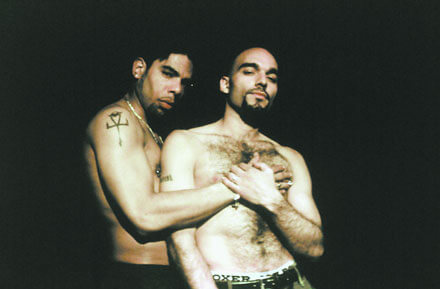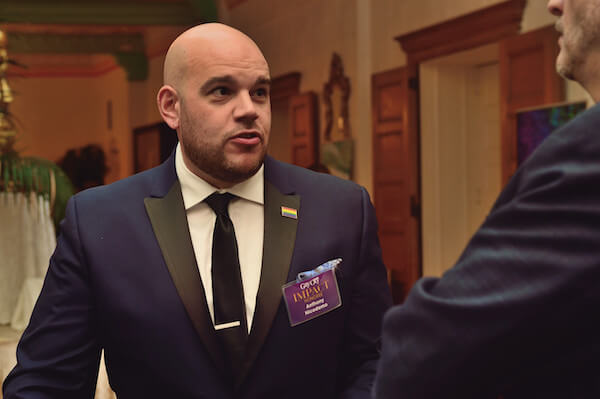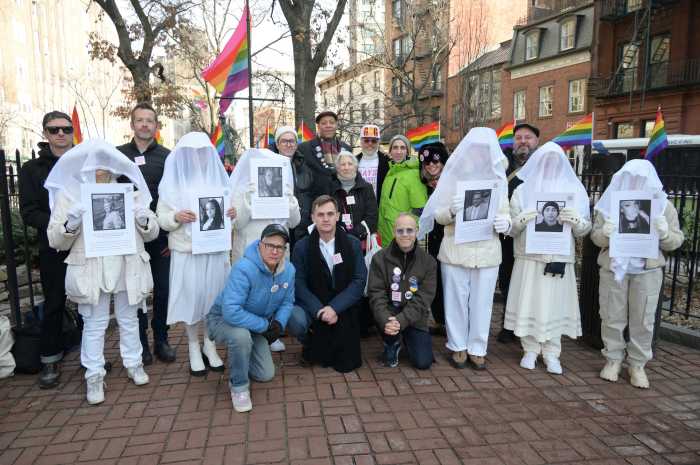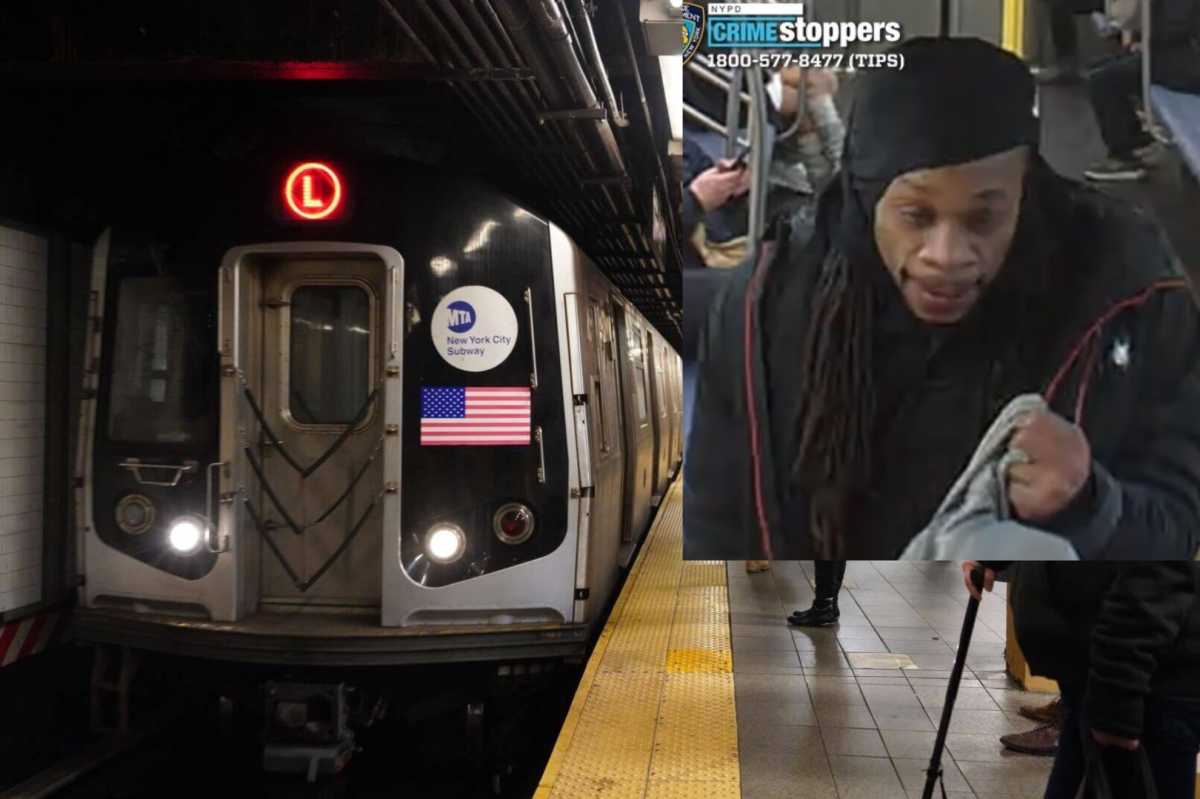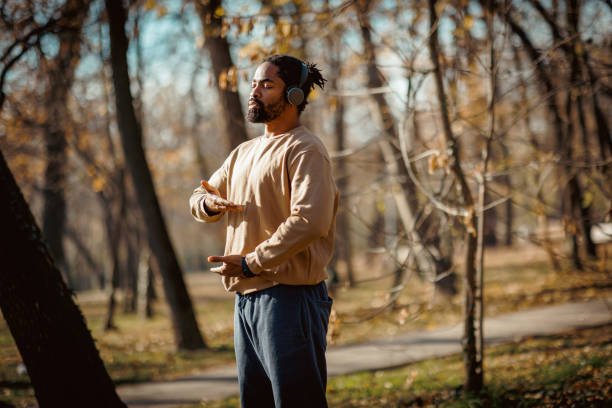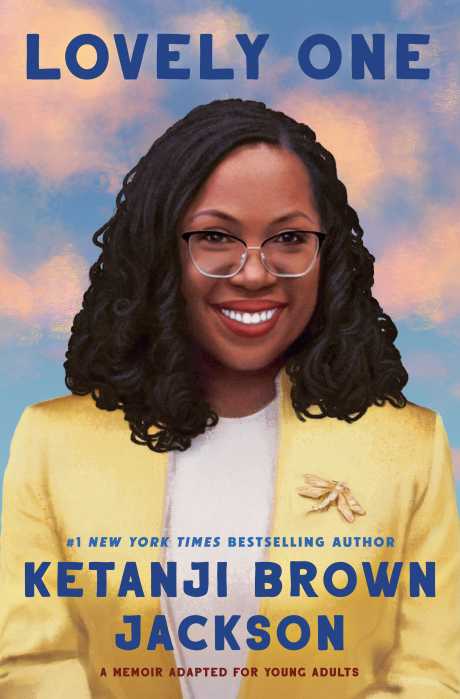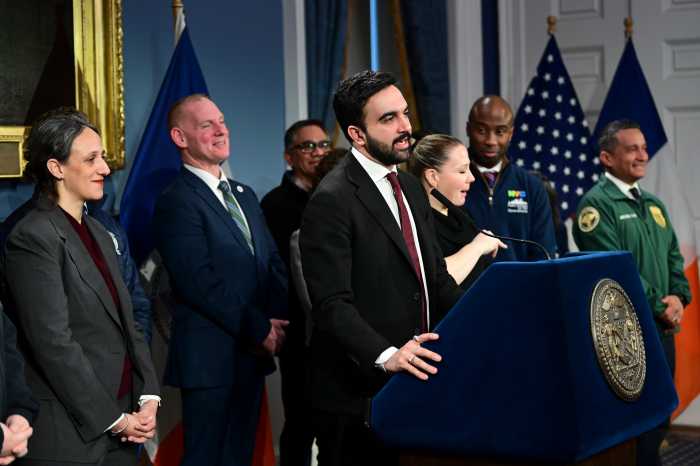Identity politics collide with bare-knuckle ethnic and economic realities for Latino hustlers
In New York’s vogue balls in the late 1980s and early 1990s, the “Banjee Realness” category was an eye-pleasing competition. Mouthwatering black and Latino guys dressed in the latest hip-hop fashions strutted on runways impersonating straight homeboys.
Many of these banjees lived in uptown Manhattan and the Bronx, the likely setting for A. B. Lugo’s “Banjee,” a play currently running at the Wings Theatre Company on Christopher Street.
“Banjee” is an entertaining and titillating dark comedy about two childhood friends who by day live heterosexual lives with their girlfriends and by night turn tricks at La Belle Vie, a sleazy hustler bar. The two male leads are lazy and uneducated, personal shortcomings that lead them to sell their bodies.
Bisexual Tony (Will Sierra) introduces his straight friend Angel (Indio Meléndez) to the world of hustling gay men. All the while, Angel claims to hate hustling, justifying it as an alternative to drug dealing.
Angel lives with his infant daughter and girlfriend Marlena (Marilyn Torres), who thinks her boyfriend works as a night security guard in Brooklyn. Tony has an on-and-off relationship with Ileana (Iris Aay-Almonte), a loud, ghetto- fabulous fashion plate on welfare who looks down on Dominicans like Tony.
A carelessly misplaced matchbook from La Belle Vie raises the women’s suspicions about their boyfriends, leading to confrontations that force all the main characters to make choices about their lives, not all of which are good decisions.
This “Banjee” is a restaging of the play’s 1999 debut at the Clemente Soto Velez Cultural Center on the Lower East Side. Much of the original cast has returned for the encore run and their acting has improved.
Both Sierra and Meléndez deliver convincing performances as shiftless homeboys who recoil in disdain at the suggestion of working in restaurants or factories, the only low-paying jobs available given their lack of skills. Andrés Rodríguez reprises his role as José, a drag queen bartender who is the play’s voice of reason.
Rodríguez is the show’s scene-stealer. His outlandish second act routine where he cleans La Belle Vie while lip-synching to Cheryl Lynn’s “Got To Be Real” is one of the show’s highlights and it was the only time the audience interrupted the play with applause.
Aay-Almonte also reprises her role as Ileana, whose primary goal is mothering a child by Tony, already the father of two other children by one or two women.
Men having sex with men who don’t consider themselves gay are a familiar phenomenon in black and Latino neighborhoods. In Spanish, this male top is known as a bugarón, derived from the English term “bugger.” The contemporary urban slang for such activity is “the down low,” a popular expression in ads posted by some black and Latino guys in chat rooms on the Internet.
Lugo’s play is essentially about two narcissistic bug-arones with low self-esteem who are drawn to prostitution because it is a source of affirmation. Desperate gay men worship Angel and Tony, homage the two young men don’t get elsewhere.
Lugo tries to articulate these men’s and their girlfriends’ motivations, but he’s not entirely successful. He’s good at sketching Angel, who gives up snorting cocaine and drug dealing for something he claims to hate, but in fact he finds psychologically empowering.
However, the girlfriends seem less multi-faceted. Marlena wants to move up in life by studying, but she’s had a baby with an unmotivated man who can only serve as a burden.
Ileana is more perplexing. She harbors ethnic prejudices against Tony, yet she wants to have his baby with no guarantee that he’ll be a better father than to the other two he has sired.
And how could he be a good father? He spends all his time drinking in hustler bars.
To its credit “Banjee” explores some explosive class and ethnic issues that are rarely openly confronted in Latino culture, such as inter-Latino ethnic prejudice. Lugo also exposes the differing mentalities between U.S.-born Latinos and immigrants.
Marlena, born in Puerto Rico, is the dysfunctional couples’ only striver. Though Puerto Rico is part of the United States, her character represents Latin American-born Latinos. The immigrants often look askance at the failure by low-income native-born Latinos to achieve middle-class success despite the fact that they speak fluent English and have all the privileges that come with citizenship.
That failure can be attributed to racial discrimination, personal irresponsibility, or a myriad of mitigating socio-economic factors. Still, it is baffling to many legal and illegal Latino immigrants who come here, find jobs, succeed, and develop a deep contempt for people like Angel, Ileana, and Tony.
Unfortunately, Lugo raises these issues without deeply plumbing them or suggesting any answers. Instead, “Banjee”’s best lesson might be that rent-thugs like Tony and Angel are bargains at $50 to $100 an encounter, since becoming emotionally attached to them is much more costly.

